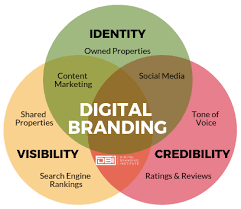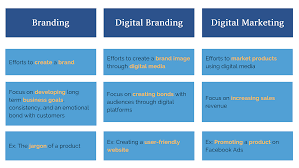The Power of Digital Brand Marketing
In today’s digital age, establishing a strong brand presence online is crucial for the success of any business. Digital brand marketing encompasses the strategies and techniques used to promote and elevate a brand’s image in the digital realm.
One of the key advantages of digital brand marketing is its ability to reach a vast audience across various online platforms. Through social media, search engine optimization, content marketing, and email campaigns, businesses can engage with their target audience in real-time and build meaningful relationships.
Furthermore, digital brand marketing allows for precise targeting and personalized messaging. By analyzing data and consumer behavior, brands can tailor their marketing efforts to specific demographics, interests, and preferences, resulting in higher conversion rates and customer loyalty.
Another benefit of digital brand marketing is its cost-effectiveness compared to traditional forms of advertising. With online tools and analytics, businesses can track the performance of their campaigns in real-time and make adjustments as needed to optimize results.
Overall, digital brand marketing offers businesses a powerful platform to showcase their identity, values, and offerings to a global audience. By leveraging the latest technologies and trends in digital marketing, brands can enhance their visibility, credibility, and competitiveness in today’s fast-paced digital landscape.
Mastering the Digital Arena: Top 9 FAQs on Elevating Your Brand with Digital Marketing Strategies
- What is digital brand marketing?
- Why is digital brand marketing important for businesses?
- How can social media be used for digital brand marketing?
- What are the key components of a successful digital brand marketing strategy?
- How does search engine optimization (SEO) impact digital brand marketing?
- What role does content marketing play in digital brand marketing?
- How can businesses measure the effectiveness of their digital brand marketing efforts?
- What are some common challenges faced in implementing a digital brand marketing strategy?
- How can businesses stay updated with the latest trends in digital brand marketing?
What is digital brand marketing?
Digital brand marketing refers to the strategies and techniques used by businesses to promote and elevate their brand’s image in the online realm. It encompasses a range of online activities such as social media marketing, search engine optimization, content creation, email campaigns, and more. Digital brand marketing allows businesses to connect with their target audience in real-time, tailor messaging to specific demographics, analyze data for insights, and optimize campaigns for maximum impact. By leveraging digital channels and technologies, businesses can enhance their brand visibility, credibility, and competitiveness in the ever-evolving digital landscape.
Why is digital brand marketing important for businesses?
Digital brand marketing is essential for businesses in today’s digital landscape because it allows them to establish a strong online presence, engage with their target audience in real-time, and build lasting relationships. By leveraging digital platforms such as social media, search engines, and email campaigns, businesses can effectively promote their brand identity, values, and offerings to a global audience. Digital brand marketing also enables precise targeting and personalized messaging, leading to higher conversion rates and customer loyalty. Furthermore, it provides valuable insights through data analytics that help businesses optimize their marketing strategies for better results. Overall, digital brand marketing is crucial for businesses looking to stay competitive, relevant, and successful in the ever-evolving digital world.
How can social media be used for digital brand marketing?
Social media plays a crucial role in digital brand marketing by providing businesses with a powerful platform to connect with their target audience, build brand awareness, and drive engagement. Through strategic content creation, targeted advertising, influencer partnerships, and community engagement, businesses can leverage social media to showcase their brand identity, communicate their values, and promote their products or services effectively. By consistently sharing relevant and engaging content across popular social media platforms such as Facebook, Instagram, Twitter, and LinkedIn, businesses can foster meaningful relationships with their audience, increase brand visibility, and ultimately drive conversions and sales.
What are the key components of a successful digital brand marketing strategy?
When it comes to crafting a successful digital brand marketing strategy, several key components play a crucial role in achieving desired outcomes. Firstly, defining clear and measurable goals is essential to guide the direction of the strategy. Understanding the target audience and their preferences allows for tailored messaging and personalized engagement. Leveraging various digital channels such as social media, email marketing, SEO, and content creation helps reach a wider audience and drive brand awareness. Consistent branding across all platforms ensures a cohesive identity and fosters brand recognition. Regular analysis of data and performance metrics enables optimization of strategies for continuous improvement. Lastly, staying abreast of industry trends and adapting to changes in the digital landscape is vital for long-term success in digital brand marketing strategies.
How does search engine optimization (SEO) impact digital brand marketing?
Search engine optimization (SEO) plays a critical role in digital brand marketing by enhancing a brand’s online visibility and driving organic traffic to its website. By optimizing website content, meta tags, and keywords according to search engine algorithms, brands can improve their search engine rankings and appear higher in search results. This increased visibility not only attracts more potential customers but also builds credibility and trust among online users. Ultimately, an effective SEO strategy can significantly impact a brand’s digital marketing efforts by increasing brand awareness, generating leads, and ultimately driving conversions.
What role does content marketing play in digital brand marketing?
Content marketing plays a crucial role in digital brand marketing by serving as the foundation for building brand awareness, establishing credibility, and engaging with target audiences. Through high-quality and relevant content such as blog posts, articles, videos, and social media posts, brands can showcase their expertise, values, and offerings to attract and retain customers. Content marketing also helps improve search engine visibility through search engine optimization (SEO) strategies, driving organic traffic to the brand’s website. By creating valuable content that resonates with their audience, brands can foster trust and loyalty, ultimately leading to increased brand recognition and customer retention in the competitive digital landscape.
How can businesses measure the effectiveness of their digital brand marketing efforts?
Businesses can measure the effectiveness of their digital brand marketing efforts through various key performance indicators (KPIs) such as website traffic, conversion rates, engagement metrics on social media platforms, email open rates, click-through rates, and return on investment (ROI). By analyzing these metrics regularly and comparing them to established goals and benchmarks, businesses can gain valuable insights into the impact of their digital brand marketing strategies. Additionally, conducting customer surveys, monitoring online reviews and sentiment analysis, and tracking brand mentions can provide further qualitative data to evaluate the overall success and impact of their digital brand marketing initiatives.
What are some common challenges faced in implementing a digital brand marketing strategy?
Implementing a digital brand marketing strategy comes with its own set of challenges that businesses often encounter. Some common hurdles include navigating the ever-evolving digital landscape, staying ahead of competitors, maintaining consistency across multiple online platforms, effectively measuring ROI, and adapting to changing consumer preferences and behaviors. Additionally, ensuring data privacy and security, creating engaging content that resonates with the target audience, and optimizing for search engines are also key challenges faced in implementing a successful digital brand marketing strategy. Overcoming these obstacles requires strategic planning, continuous learning, flexibility, and a deep understanding of the digital marketing ecosystem.
How can businesses stay updated with the latest trends in digital brand marketing?
To stay updated with the latest trends in digital brand marketing, businesses can engage in continuous learning and research. It is essential for businesses to follow reputable industry publications, attend webinars and conferences, and participate in online forums to stay informed about emerging technologies and strategies. Networking with other professionals in the field and collaborating with digital marketing experts can also provide valuable insights into current trends. Additionally, investing in ongoing training for employees and leveraging analytics tools to track performance metrics can help businesses adapt to evolving market dynamics and maintain a competitive edge in the digital landscape.



